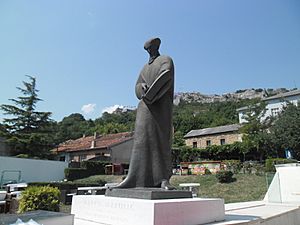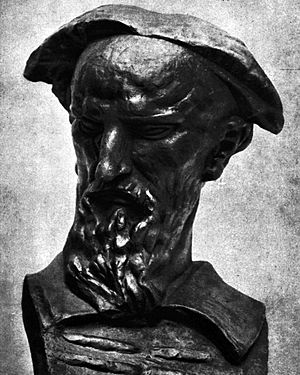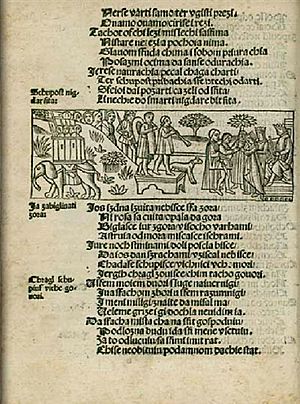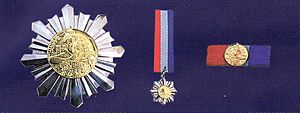Marko Marulić facts for kids
Quick facts for kids
Marko Marulić
|
|
|---|---|
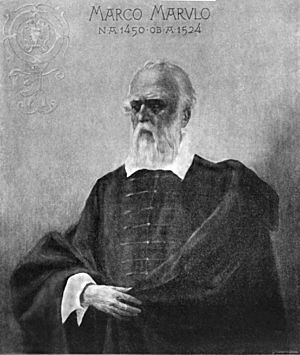
1903 illustration
|
|
| Born | 18 August 1450 Split, Republic of Venice (modern-day Croatia) |
| Died | 5 January 1524 (aged 73) Split, Republic of Venice (modern-day Croatia) |
| Occupation | Poet, humanist |
| Language | Latin, Croatian |
| Period | Renaissance |
| Notable works | Judita Davidiad |
Marko Marulić (born August 18, 1450 – died January 5, 1524) was a famous Croatian poet, lawyer, and humanist. He is known for creating the word "psychology". Many people call him the national poet of Croatia.
His long poem Judita was the first major poem written in the Croatian language. This work made him as important to Croatian literature as Dante is to Italian literature. Marulić also wrote excellent Latin poetry, which led his friends to call him "The Christian Virgil".
People have described Marulić as the "crown of the Croatian medieval age" and the "father of the Croatian Renaissance" and "The Father of Croatian literature." He knew a lot about the Christian Bible and ancient Greek and Latin writings. His works were admired across Europe by important people like Saints Francis Xavier and Charles Borromeo, kings like King Henry VIII, and thinkers like Thomas More.
More recently, Pope John Paul II even quoted one of Marulić's poems during his visit to Solin, Croatia in 1998.
Contents
Biography
Marko Marulić was born on August 18, 1450, into a noble family in Split, Dalmatia. He was the first of seven children. The house where he was born can still be seen in Split today. His family started using the name Marulić in the 15th century. His mother, Dobrica de Albertis, was also from a noble family.
We don't know many details about Marulić's early life. He went to a school in Split run by the Italian humanist Tideo Acciarini. He also learned Greek. After school, he likely studied law at Padua University. He spent most of his life in Split.
After a difficult love story, Marulić lived for about two years in a monastery on the island of Šolta. When he returned to Split, he worked as a lawyer and a judge. Because of his work, he became a very important person in Split's group of humanists.
Marulić wanted to be a "universal man," which was a goal for many people during the Renaissance. This meant he was interested in many things, like painting, drawing, history, languages, and poetry. His main goal was to help renew Christianity. Like other humanists, he often spoke out against bad behavior among Roman Catholic priests.
Marulić's book Evangelistarium was first published in 1487. It was a collection of moral and religious texts from the Old and New Testaments. This book became very popular and was reprinted many times.
Between 1496 and 1499, Marulić wrote De institutione bene vivendi per exempla sanctorum. This book gave advice on how to live a good life using examples from saints. It was first published in Latin in Venice in 1507. This book was translated into many languages and made Marulić famous across Europe.
Marulić sometimes traveled to Venice for trade and to Rome for religious events. He also admired a religious movement called Devotio Moderna. By 1509, he had translated The Imitation of Christ by Thomas à Kempis from Latin into Croatian. This translation was not published until 1989.
In 1510, Marulić wrote The Deeds of the Kings of Dalmatia and Croatia. He finished The Life of St. Jerome in 1513. The next year, he completed Carmen de doctrina Domini nostri Iesu Christi pendentis in cruce, a famous Christian poem in Latin.
In 1517, Marulić finished his epic poem Davidiad. This poem was lost for over 400 years and was only found again in 1952. His final works were De ultimo Christi judicio and Judita. Judita is a Christian epic poem that retells the story from the Book of Judith in the Croatian language. He wrote it between 1520 and 1522. This poem earned him the title "Father of Croatian literature."
Marko Marulić passed away in Split on January 5, 1524. He was buried in the Church of St. Francis in the old city center.
Legacy and Influence
Marulić's book Liber de laudibus Herculis was published after his death in 1524. In this book, he compares the pagan hero Hercules with Jesus Christ, showing Christ as the ultimate victor.
Even though Marulić and Martin Luther lived at the same time, they didn't know each other. However, they both believed in "Gospel Truth" and wanted to renew Christianity. Marulić remained loyal to the Catholic Church, while Luther started the Protestant movement.
Marulić's writings were admired by many important Catholic saints and also by Protestants. This shows that he was a very important and influential writer during the Renaissance.
During the 16th and 17th centuries, Marulić's three most popular books were De institutione bene vivendi per exempla sanctorum, Evangelistarium, and Quinquaginta parabole. By 1680, these books had been reprinted more than eighty times. They were translated into many European languages, including Italian, German, French, Spanish, and even Icelandic.
The British Library still has King Henry VIII's Latin copy of Marulić's Evangelistiarium. King Henry VIII used Marulić's book when he wrote his own book against Lutheranism.
Marulić's De institutione bene vivendi per exempla sanctorum was a large book about Christian morals. It ended with his famous Latin poem Carmen de doctrina Domini nostri Iesu Christi pendentis in cruce. This book influenced St Francis Xavier, who was a missionary. It was said to be the only book he carried with him during his missionary work.
While he was in prison, St. Philip Howard translated Marulić's poem Carmen de doctrina Domini nostri Iesu Christi pendentis in cruce into English verse.
On October 4, 1998, Pope John Paul II quoted from Marulić's poem during his visit to Solin, Croatia. He said, "Happy the one who always puts his life to good use." He stressed the importance of choosing true values.
Currency and Medals
Marulić's picture was on the Croatian 500 kuna banknote, which was issued in 1993.
The Croatian state award for culture, the Order of Danica Hrvatska, also has Marko Marulić's face on it.
MARUL Award
The Festival of Croatian Drama in Split, Croatia, is named after Marulić. It is called 'Festival Marulićevi dani' and gives out annual MARUL awards.
Writing
Marko Marulić was a central figure in the humanist group in Split. He was inspired by the Bible, ancient writers, and Christian stories. Most of his writings were about Christian ideas and Christian ethics. He wrote many poems, discussions, and epic poems. He wrote in three languages: Renaissance Latin (most of his works), Croatian, and Italian (a few letters and sonnets).
Croatian Works
Marulić's Croatian works are very important. His most famous Croatian work is the epic poem Judita. He wrote it in 1501, and it was published in Venice in 1521. It is based on the Biblical story from the Book of Judith. He wrote it in the Čakavian dialect, which was his mother tongue.
Other works he wrote in Croatian include:
- Poklad i korizma (Carnival and Lent), Spovid koludric od sedam smrtnih grihov ("A Nun's Confession of the Seven Deadly Sins"), Anka satir (Anka: A Satire) – these are secular poems and poems for his sister.
- Tužen'je grada Hjerosolima (Jerusalem's Lament) – poems about the Turkish invasions.
- Molitva suprotiva Turkom ("A Prayer Against the Turks") – a long poem written between 1493 and 1500. It has a hidden message that says, "Only God with his infinite might can save us from the misery of our enemies Turks."
Latin Works
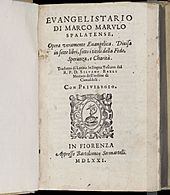
Marulić's fame across Europe came mostly from his works written in Renaissance Latin. These works were published many times.
He published Psichiologia de ratione animae humanae, which is the first known place where the word "psychology" was used in writing.
In 1517, Marulić finished the Davidiad. This was an epic poem that retold the Old Testament story of King David in Latin. It also included references to Greek and Roman mythology. The Davidiad was very similar to Virgil's Aeneid. Because of this, people at the time called Marulić the "Christian Virgil from Split."
Sadly, the Davidiad was thought to be lost for over 400 years. It was only rediscovered in 1952 and first published in 1954.
Marulić was also active in the fight against the Ottoman Turks, who were invading Croatian lands. He wrote a Latin letter to Pope Adrian VI asking for help. In another poem, In discordiam principium Christianorum, he criticized European leaders for fighting among themselves instead of uniting against the Ottoman Empire.
Glasgow Codex
A recently found manuscript of Marko Marulić in the University Library of Glasgow has shown new things about his work. It was discovered in 1995. The poems in this book include some very strong, funny poems (satires). They also show his love for animals. The biggest surprise was finding love poems written by Marulić.
Visual Artist
It is believed that Marulić was also a talented artist. In his will, he left his sister a book that he had illustrated himself. The second edition of his famous poem Judita, published in 1522, has nine woodcut illustrations. One of them is signed with the letter "M," which suggests Marulić might have created these pictures himself.
See also
 In Spanish: Marko Marulić para niños
In Spanish: Marko Marulić para niños
 | Jessica Watkins |
 | Robert Henry Lawrence Jr. |
 | Mae Jemison |
 | Sian Proctor |
 | Guion Bluford |


